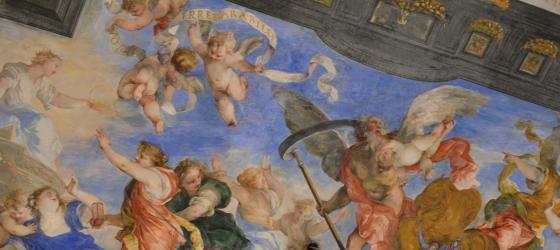Call for Applications
SIE International Summer School 2026
Experiential Artifacts: Art, Technology, and Experience
31 August – 4 September 2026, Università di Genova
Organized by Società Italiana di Estetica
and the ERC project "PEA - The Philosophy of Experiential Artifacts" (G.A. n. 101040535)
The Summer School aims to offer students, PhD candidates, and early-career researchers (PhD awarded in 2020 or later) an intensive five-day teaching and research programme that brings together aesthetics, philosophy of technology, and philosophy of mind. The goal is to investigate the relationship between art, technology and experience.
On the one hand, works of art are created entities just like artefacts. On the other hand, artefacts have functions but determining the function of art in general, and of individual works of art, is a problematic and divisive task in contemporary aesthetics. A possible solution to this problem is to reconceive works of art as artefacts whose function is to generate experiences. In this way, for instance, paintings can be assigned the function of eliciting visual experiences, and novels the function of generating imaginative experiences. Developing this proposal requires bringing aesthetics into dialogue with the philosophy of technology, in order to develop the notion of experiential function, and with the philosophy of mind, in order to analyse the experiences to be associated with different works of art. The Summer School’s programme will draw on the invited speakers’ specialised expertise in each of the research areas mentioned, providing interdisciplinary training on the relationship between art, technology and experience, so as to lead participants to develop personal research on this topic.
The Summer School is organised across five consecutive days: an initial half-day introduction (Day 1, afternoon only), three central days (Days 2-4), and a final day (Day 5). The structure is as follows: three conference sessions and three workshop sessions during the central days, preceded by a preparatory meeting and followed by a session in which students present their work, and a concluding roundtable.
In order to ensure that the workshop activities are focused, applicants are required to submit, as part of the application, a research idea (max 500 words) to be developed during the summer school workshops. The research idea will be used for selection, for the assignment of tutors, and as a reference point for the last day’s presentations to be developed during the afternoon workshop meetings. See below for further instructions on the submission process.
Coordinator: Enrico Terrone (Università di Genova)
Tutors: Luca Marchetti (Università di Genova) and Nick Young (Università di Genova)
Invited speakers:
María José Alcaraz León (Universidad de Murcia)
Elisa Caldarola (Università di Torino)
Simon Evnine (University of Miami)
Anna Giustina (Universitat de Valencia)
Wybo Houkes (Eindhoven University of Technology)
Derek Matravers (The Open University)
Elisabeth Schellekens (Uppsala Universitet)
CALL FOR PROPOSALS
Please submit proposals by writing to: pea@unige.it
Submissions should be done as PDF files prepared for blind review and include:
- a research idea (max. 500 words, references excluded);
- a Curriculum Vitae;
- a motivation letter (max. 1 page).
The deadline for receipt is 30 April 2026.
Participants will be notified of decisions by 31 May 2026.
There will be no participation fee. Selected participants will be provided with accommodation for six nights, as well as lunches and coffee breaks during the Summer School. Travel support of up to €300 per person will also be available.
